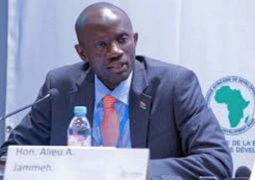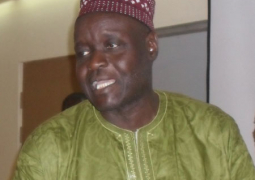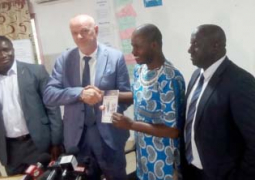“Dr. Lee is nice, old, intellectual — very respected,” said Dr. Steve Kuo, who coordinated Taiwan’s SARS task force. “And he speaks an authentic Taiwanese dialect. Whatever channel you turned to, there he was. That was very useful.”
Unusual tactics and inventive thinking will be needed to beat West Africa’s Ebola outbreak, according to some of the world’s top experts in disease eradication. About 3,000 Africans have been infected and about half of those have died. The World Health Organization has warned that infections could rise to 20,000, and Senegal on Friday announced its first case, a Guinean who entered a hospital in the capital, Dakar, seeking treatment.
Leadership must be imposed, the experts said, perhaps with a West African in charge. Donors must commit at least $500 million. And a new strategy is needed, with the first priority being to stop the panic caused by imprisoning residents of the affected countries behind barbed wire and roadblocks.
The outbreak will not end, they argued, until average citizens calm down and help their infected neighbors instead of fleeing from them.
“Liberians are not going to be saved by internationals coming in,” said Dr. Bruce Aylward, one of the leaders of the drive to eliminate polio and an author of the health organization’s Ebola-fighting plan introduced this week. “They’re going to be saved by Liberians.”
The New York Times asked 10 leaders of the fights against smallpox, polio, SARS, rinderpest, Guinea worm and other diseases — some of them legends in their fields — for their views on how best to fight the outbreak.
All offered suggestions, but several asked not to be quoted by name for fear of appearing to undercut W.H.O. and United Nations leadership.
Most agreed on many basic principles. All, for example, were sure the outbreak could be stopped without experimental drugs or vaccines. None expected it to take less than six months.
All said that Western countries needed to help generously, especially those with long ties to affected nations: the United States to Liberia, Britain to Sierra Leone and France to Guinea. Their militaries may be useful, as long as they only deliver supplies, set up field hospitals, provide electricity and communications — and avoid anything that involves brandishing weapons, including enforcing quarantines.
The experts were universally appalled at the sight of rural areas hemmed by roadblocks and a slum in the Liberian capital, Monrovia, with barbed wire that made residents believe they were being locked in to die; they were even more appalled that soldiers used truncheons and bullets during what was supposed to be a public health effort. On Friday, the government said the quarantine of the slum, West Point, would be lifted on Saturday morning.
“People are going to break out — and a lot may get killed if they try,” said Dr. Peter L. Roeder, a British veterinarian who directed the final eradication campaign against rinderpest, a lethal cattle disease that led millions of Africans to starve to death in the 1890s and was declared eradicated in 2011. In that fight, he said, “if you went in heavy-handed and slapped on a quarantine, people just ran away with their cattle and dispersed the disease.”
To prevent panic, respected leaders must quell rumors, as Dr. Lee did. West Africa is not Taiwan; there are nearly 100 tribal languages, literacy is low and televisions rare. Radio is useful, experts said, but the key is to get trusted local leaders like chiefs, clerics, midwives and traditional healers to do the job. Ebola survivors “should be publicized,” one expert said, “so people understand that they don’t have to die if they come in for care.”
Pay is also an issue, experts said. Health workers taking huge risks must be compensated, and so must their families if they die.
Aziz Memon, a Pakistani textile executive who helps lead the fight against polio for the international Rotary Club, noted that when Taliban gunmen killed polio vaccinators in his country two years ago, vaccinators’ pay was doubled; for those in the riskiest areas, it quadrupled. To the families of those murdered, Rotary paid $10,000 in compensation.
Several doctors who helped eradicate smallpox — which had a 30 percent fatality rate — said they sometimes paid victims and their families in food and cash to stay indoors. Whole villages were paid to build quarantine huts where the sick were cared for by neighbors who had survived or had been vaccinated.
“Large amounts of money in small denominations can do a lot of good,” said Dr. Joel G. Breman, who has fought smallpox in West Africa and the first Ebola outbreak in 1976.
Doctors Without Borders, Unicef and other aid groups have said that they are struggling to find expatriate doctors, nurses and logistics personnel willing to go in. Most get modest stipends. Offering more might work, experts said, as might recruiting in countries with lower-paid health professionals like India or the Philippines.
Also, this outbreak is like SARS in that doctors and nurses are in the highest risk group. Training must be extra-thorough — especially in taking off protective gear that might be smeared with virus. Nigeria, for example, does not let anyone near victims without three days of training on wearing protective gear, said its health minister, Dr. Onyebuchi Chukwu.
Dr. Donald A. Henderson, a leader in the fight against smallpox who is now the dean emeritus of the Johns Hopkins Bloomberg School of Public Health, suggested a tactic that some of his peers found controversial. The outbreak has been so mismanaged, he said, that it may initially be wise to quarantine only obviously ill Ebola victims and temporarily abandon isolating their relatives and contacts. Eventually, all will have to be monitored, but seemingly healthy people have been forced into hospitals alongside the dying. That people go into hospitals in good shape only to die makes others flee from health teams.
Also, the experts agreed, rapid diagnostic testing is crucial, because the early symptoms — fever, headache and vomiting — mimic those of common diseases like malaria and typhoid. Quarantining people with easily curable ills alongside Ebola patients is a deadly error.
Clear, courageous leadership is also essential. In Liberia, some cabinet ministers and senior civil servants fled overseas, leading President Ellen Sirleaf Johnson to fire them.
“This is not just a U.N. responsibility,” said Dr. David L. Heymann, who has fought Ebola, SARS and polio and is now the chairman of Britain’s Health Protection Agency. “Hopefully, there will be local African champions.”
Right now, Dr. Margaret Chan, the World Health Organization’s director-general, and Dr. David Nabarro, the new senior United Nations coordinator for Ebola, share leadership. But, the experts said, a command center must be established in West Africa with representatives of all affected countries.
To quell rumors that the disease is spread by foreign doctors, it might be prudent, some experts said, to put an African doctor in charge. Dr. Chukwu and his Ghanaian counterpart were mentioned as possibilities.
Experts estimated that the fight would cost $500 million or more — Dr. Aylward calculated that up to 1,500 field hospital beds will be needed — about five times as many as are now available; field hospitals need about four staff members per patient, and also generators, water purifiers, laboratories, kitchens, vast amounts of protective gear and supplies. The new W.H.O. road map calls for 12,000 local health workers and 750 expatriates.
To build trust and lower death rates, especially because local hospitals are not functioning anymore, the plan will have to include treating less exotic but still potentially fatal illnesses like malaria and pneumonia.
Also, areas under quarantine will require food shipments for months. At the moment, an area in Sierra Leone and Liberia about the size of New Jersey with 1 million people in it has been cordoned off.
“There’s no part of this you can’t break down and make work,” Dr. Aylward said. “But it took us 20 years to build the polio response, and this has to be done in 20 days. You’re building the boat as you sail.”
Guest opinion piece published for the education and information of our esteem readers. It is an Op-ed piece by Donald G McNeil Jr. Source: New York Times 29 August 2014
“All said that Western countries needed to help generously, especially those with long ties to affected nations: the United States to Liberia, Britain to Sierra Leone and France to Guinea. Their militaries may be useful, as long as they only deliver supplies, set up field hospitals, provide electricity and communications — and avoid anything that involves brandishing weapons, including enforcing quarantines.”
Donald G McNeil Jr.




